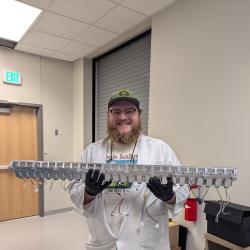Four Sloan Research Fellowships Awarded to UMD Faculty Members
Four University of Maryland faculty members were awarded 2015 Sloan Research Fellowships. This award, granted by the Alfred P. Sloan Foundation, identifies 126 early-career scientists based on their potential to contribute fundamentally significant research to a wider academic community.
UMD’s 2015 Sloan Research Fellows are:
- Jacob Bedrossian, assistant professor of mathematics and member of the Center for Scientific Computation and Mathematical Modeling
- Mohammad Hafezi, assistant professor of electrical and computer engineering, Joint Quantum Institute Fellow, and member of the Institute for Research in Electronics and Applied Physics
- Vladimir Manucharyan, assistant professor of physics and Joint Quantum Institute Fellow
- Alyson Santoro, assistant professor at the University of Maryland Center for Environmental Science’s Horn Point Laboratory
These four awardees join the list of 56 UMD faculty members to receive the honor since the first fellowships were awarded in 1955. Fifty-five of UMD's awardees are faculty members in the university's College of Computer, Mathematical, and Natural Sciences.
Bedrossian’s research focuses on stability and mixing in fluids and plasmas, and includes calculus of variations and pattern formation in solid mechanics, qualitative properties of Patlak-Keller-Segel models and its variants for the collective motion of microorganisms, and scientific computing with a focus on moving geometry and computational fluid dynamics. He will use the award to support students and foster collaborations with other universities.
Prior to joining UMD in 2014, Bedrossian was a National Science Foundation Postdoctoral Fellow and Cathleen Morawetz Postdoctoral Fellow at the Courant Institute of Mathematical Sciences, New York University. He earned his B.S. in mathematics and M.S. in applied mathematics from Case Western Reserve University, and Ph.D. in mathematics from the University of California, Los Angeles.
“It is a great honor to receive this prestigious fellowship. I would like to thank the Alfred P. Sloan foundation for their continued efforts to support scientific and mathematical advances and the University of Maryland for providing such an excellent environment in which to pursue pure and applied mathematical research,” said Bedrossian.
Hafezi’s research interests include the theoretical and experimental investigation of strongly correlated systems and topological physics, nanophotonics and optomechanics, and hybrid quantum systems. Prior to joining the UMD faculty in 2014, Hafezi was a senior research associate in the Joint Quantum Institute. He earned his B.S. in physics from École Polytechnique in Paris and his Ph.D. in physics from Harvard University.
“Looking at the list of luminaries who have been given this award in the past, I am very humbled,” said Hafezi.
Manucharyan’s research interests include low-temperature experimental solid-state physics with an emphasis on making, measuring and manipulating superconductivity-based individual quantum systems. He will use the award to support his experimentation with complex quantum superconducting circuits as well as mesoscopic and topological superconductivity.
Prior to joining UMD in 2014, Manucharyan was a Junior Fellow of the Society of Fellows of Harvard University and a visiting professor at École Normale Supérieure in Paris. He earned his B.S. with honors from the Moscow Institute of Physics and Technology and his M.S., M.Phil., and Ph.D. in physics from Yale University.
Santoro’s research interests include microbial ecology, nitrogen cycling and marine archaea. Her lab studies single-celled organisms—bacteria and archaea—and uses a combination of laboratory and field studies to understand the ecology of these organisms and their contribution to global elemental cycles. Her group uses molecular biology, cultivation and stable isotope geochemistry to answer questions about the distribution, abundance and diversity of marine archaea.
Prior to joining Horn Point Laboratory in 2011, Santoro was a Woods Hole Oceanographic Institution Postdoctoral Scholar. She earned her B.A. in ecology and evolutionary biology from Dartmouth College, and her M.S. and Ph.D. in environmental engineering and science from Stanford University.
"I am honored to join the distinguished list of Sloan Fellowship recipients. The fellowship will allow me to pursue new, creative projects that would not be possible to fund with traditional state and Federal funding,” said Santoro.
Each 2015 Sloan Research Fellow is awarded a two-year $50,000 grant to support their research interests. The fellowships are awarded in eight scientific and technical fields—chemistry, computer science, economics, mathematics, computational and evolutionary molecular biology, neuroscience, ocean sciences and physics. Candidates must be nominated by their fellow scientists and winning fellows are selected by an independent panel of senior scholars on the basis of a candidate’s independent research accomplishments, creativity and potential to become a leader in his or her field.
Since the beginning of the program, 43 fellows have received a Nobel Prize in their respective field, 16 have won the Fields Medal in mathematics, 65 have received the National Medal of Science, and 14 have won the John Bates Clark Medal in economics, including every winner since 2007.
“The beginning of one’s career is a crucial time in the life of a scientist. Building a lab, attracting funding in an increasingly competitive environment, and securing tenure all depend on doing innovative, original high-quality work and having that work recognized,” said Paul L. Joskow, president of the Alfred P. Sloan Foundation. “For more than 50 years the Sloan Foundation has been proud to celebrate the achievements of extraordinary young scientists who are pushing the boundaries of scientific knowledge.”
Writer: Mary Kearney







